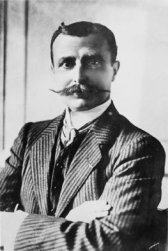Pin any Geography teacher into a corner and they will tell you Britain is a group of islands – which means we are surrounded by sea, of course, and that defines our integrity as a race: ‘This precious jewel set in a silver sea’ etcetera. Except it doesn’t. Our island race is constantly compromised, and the problem is the sea, which isn’t wide enough.
Specifically I refer to the English Channel, which guards our southern shore: in one place it is only 22 miles wide. I mean, that isn’t a sea, is it? It’s a channel, or, in the familiar, a ditch. In places the River Amazon is over 6 miles wide, so that makes less than 4 Amazons’ widths between us and France.
Uncomfortable.
Proximity aside, there’s something about the English Channel. Cosmetically unattractive (cold, rough, rather bad-tempered) it draws out the expeditionary spirit. Everyone wants to cross it, even if they have no conceivable reason. Caesar tried, and no matter how loudly we Brits voiced our objections, he tried again; this against the Channel gales with ships that were powered by oars and sails that couldn’t tack.
In 1785 Blanchard and Jeffries crossed it in a hydrogen balloon. They landed in a tree, which should have put them off, but didn’t. January, it was, and they even had to throw off most of their clothes to save weight. Can you picture a moustachioed Frenchman and an American falling out of a snow-laden tree in their underpants? Zut alors!
Soon people started swimming across.
A sailor did it first, floating on top of a bale of straw: why, I ask you? Why?
Then there was Captain Webb in 1875, the world and his wife since. In 1961 Antonio Abertondo swam from England to France, but disliked the French so much he swam straight back again, and did the whole thing, there and back, in 43 hours .
These days the swimming thing’s gone off the boil a bit, but in the 1960s and 1970s you couldn’t move on the beach at Dover for a thin straggling line of goose-grease smothered intrepids – housewives from Oldham, bank clerks from Surrey, all doing their bit ‘for charity’. Their times have improved, too. Captain Webb took nearly 23 hours, whereas today’s man-in-the-street time for the crossing seems to average around 14 hours.
Back in 1909 Louis Bleriot flew across in his monoplane; the first heavier-than-air craft to do so, in a flight that took around 36 minutes.
Someone else did more or less the same flight, last Friday, a little more slowly. Didier Esteyne flew solo from Lydd, in Kent, to Calais, the opposite way to Bleriot, in about 40 minutes. 106 years after the French inventor and aviation pioneer this may seem unremarkable, if I were to neglect to include the information that his plane, the two-seat Airbus E-Fan, was entirely powered by electricity.
It is a little longer, 112 years, since the Wright Flyer made its first teetering steps at Kitty Hawk. Few can have foreseen in that frail agglomeration of wood and string the great jets which have taken over modern travel; yet Alcock and Brown were making their first flight across the Atlantic within 20years and within 50 years we were transporting passengers halfway around the world using jet engines. From the Wright Brothers to the De Havilland Comet: from 37 miles per hour to 490. Evolution has been rapid.
Another electrically-powered, and solar energy fuelled ‘plane, ‘Solar Impulse’ is resting in Hawaii today, waiting to take the next step on its round-the-world flight. Watching the video footage of its improbably gawky frame as it is helped into the air, its wings held up by poles in the hands of two supporters sprinting alongside it and a frantic cycle rider beneath its tail I cannot help thinking of the Wright Flyer’s first tentative steps. As a writer with an interest in Science Fiction these achievements, one mighty and one small, are honing and altering my vision of a future where the oceans may be crossed without leaving behind a trail of black smoke: they induce a picture of a slower, more stately version of civilization; one in which, perhaps, our kind can reap some rewards from our centuries of chasing after those two impostors, power and growth.
It will not happen in my time, perhaps not in the time of my sons, but of their children, and those who come after them. It is, for me, a first gleaming beacon of hope in a dark sky: something we can achieve in our world which causes zero damage. I would love to be here to travel the skies fifty years after Solar Impulse – maybe some of you will.

Leave a comment